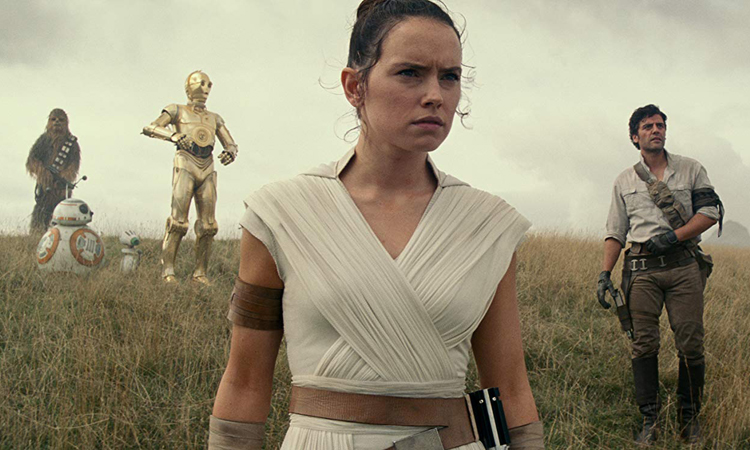The end of the Skywalker saga is finally here. After one conclusion, a sixteen-year break, a second conclusion, a ten-year break, and four additional years of Star Wars, the third and final conclusion has arrived (barring a revival on Disney+). Its arrival is sure to rile up the Star Wars fan base, which erupt into extreme degrees of either praise or vitriol after The Last Jedi dared to try something ambitious. But because ambition drove away some vocal fans, Disney and J. J. Abrams are avoiding it like the plague in The Rise of Skywalker, sans the movie’s primary ambition of not being The Last Jedi.
Rian Johnson’s divisive entry in the Star Wars universe shook up the franchise by actually being about something. Rather than shelling out details that keyboard-ready fans could use to update Star Wars wikis, The Last Jedi revolved tightly around meaningful themes: namely, the dissolution of the moral binary and the democratization of heroism. It revitalized a story that was losing its richness—grey was introduced to yet another retelling of dark vs. light, and no longer did characters have to be chosen by blood to matter to the universe. For a series that was always an unveiled metaphor for fighting authoritarianism, it perfectly reflected the complex, grassroots struggles of today.
But it paid little attention to fan expectations (much like, uh, The Empire Strikes Back), so detractors spent the better part of two years crucifying it. And like an emperor afraid of losing their subjects, Disney has caved to their virulent whines: the entire first half of The Rise of Skywalker is a hurried reversal of everything The Last Jedi accomplished.
By nature, sequels jump off of a stage that was already set for them—but because The Rise of Skywalker refuses to have anything to do with The Last Jedi, it runs around trying to set a whole new stage for an hour and fifteen minutes. This, surprisingly, turns out to be an unwieldy process. It’s like a child shredding their diary and trying to reassemble the pieces into a Bible before their parents walk in. In The Rise of Skywalker’s fervor to retcon The Last Jedi, it ironically exacerbates The Last Jedi’s biggest problem: pacing. Character reveals and new characters and plot twists fly by at a blistering speed, stripping the old stage clean and laying down enough groundwork to fill two movies. It’s a rush job.
The first half is so busy slamming the reset button that its new elements sputter out upon arrival. Major plot changes are announced perfunctorily, with little to no buildup; new characters’ motivations turn on a dime; the narrative is reduced to a series of fetch quests and deus ex machinas. The Rise of Skywalker is more concerned with replacing a previous story than telling a good one itself. During this lightspeed replacement, the movie barrels through several tones and emotions, ricocheting between John Williams’ iconic songs with nary a moment to think. It’s gratuitously indulgent, but what in?
Empty nostalgia, it turns out. As part of its mission to carve a new identity out of old things, The Rise of Skywalker declares that Palpatine is alive and has been pulling the First Order’s strings all along. The reveal doesn’t fit with the trilogy’s trajectory, though, which had clearly been exploring grey morality via Kylo Ren. The movie rejects the irreconcilable conflict within Ben Solo in favor of a basic, shadowy evil, and Kylo is reduced to another ‘will-they-won’t-they’ flip-flopper between light and dark. Thankfully, Adam Driver keeps playing the character with tortured insides, and his journey remains compelling largely because of his performance.
Though Palpatine’s return is a misstep from a narrative perspective, it does allow Abrams and team to engage in eerie design choices. The visual and audial motifs surrounding neo-Palpatine are commendably sinister: shrieking violins, roaring lighting strikes, enough dark garb to clothe a My Chemical Romance reunion tour. Abrams may fumble the heart of the story, but he’s definitely tuned into the trappings. His penchant for practical effects and idiosyncratic design is a nice, if superficial, reminder of the Star Wars of yore. Just don’t expect any action to approach the scope of the prequels or the artistry of The Last Jedi’s throne room battle.
The Rise of Skywalker’s second half fares a little better, on a lizard brain level: it’s dopamine-inducing to see the good guys do good things, especially alongside the best special effects that money can buy. Disney didn’t just contribute a massive budget, though—they also bog the movie down with spinoff setups and bare-minimum efforts at representation. The Rise of Skywalker works best as thoughtless opiate, and even that’s complicated by Disney’s interminable desire to extend their franchises’ lifespans. It’s like the movie refuses to work at every turn. Even the central trio of Rey, Finn, and Poe, who fans so desperately wanted to see together again, suffers from a painful lack of chemistry.
Even if you didn’t like The Last Jedi, it’s impossible to deny that The Rise of Skywalker’s rejiggering exercise is fatally haphazard. It seems that this is how the Skywalker saga ends: with a formulaic act of cowardice.
★½ (1.5/5)




